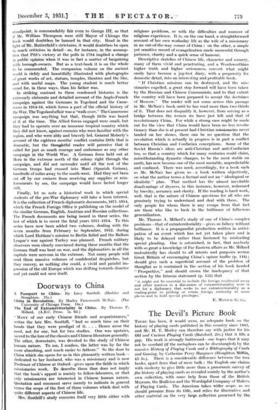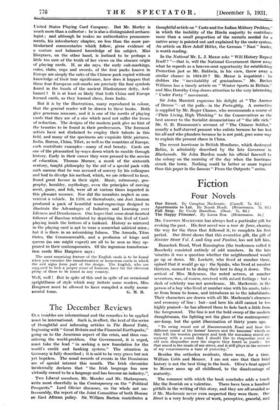The Devil's Picture Book THERE has been, it would seem,
no adequate book on the history of playing cards published in this country since 1865, and Mr. H. T. Morley can therefore say with justice for his Old and Curious Playing Cards (Batsford, 21s.) that it ffils a gap. His work is strongly buttressed—one hopes that it may not be overlaid (if the metaphors can be disentangled) by the massive History of Playing Cards and a Bibliography of Cards and Gaming, by Catherine Perry Hargrave (Houghton Mifflin, £5 5s.). There is a considerable difference between the two books, apart from that of mere bulk : the English one claims with modesty to give little more than a panoramic survey of .the history of playing cards as revealed mainly by the author's own collection, with some help from those of...the. British Museum, -the Bodleian and the Worshipful Company of Makers of Playing Cards... The American takes wider scope, as we should_ presume .from its title,. and. relies for illustrative. and other material on the very large collection possessed. by..the
United States Playing Card Company. But Mr. Morley is much more than a collector : he is also a distinguished archaeo-
logist ; and although he makes no authoritative pronounce- ments, his introductory chapter, no less than the more par- ticularized commentaries which follow, gives evidence of a mature and balanced knowledge of his subject. Miss Hargrave, on the other hand, is inclined to be perhaps a little too sure of the truth of her views on the obscure origin of playing cards. If, as she says, the early suit-markings, coins, dubs, cups and swords, of the first packs known in Europe are simply the suits of the Chinese pack copied without knowledge of their true significance, how does it happen that
these four European suit-marks are precisely the four symbols found in the hands of the ancient Ilindostanee deity, Ard- hanari ? It is at least as likely that both China and Europe learned cards, as they learned chess, from India.
But it is by the illustrations, many reproduced in colour, that the general reader will be drawn to these books. Both give generous measure, and it is one of the merits of playing cards that they are of a size which need not suffer the losses of reduction. The designs of the modern pack give no hint of the beauties to -be found in their predecessors. The foremost artists havn not disdained to employ their talents in this field, and many of the specimens are exquisite little pictures. India, Burma, China, Tibet, as well as the countries of Europe, each contribute examples—many of real beauty. Cards are one of the pleasantest by-ways down which to ramble through history. Early in their career they were pressed to the service of education. Thomas Murner, a monk of the sixteenth century, taught philosophy by the aid of a special pack with such success that he was accused of sorcery by his colleagues and had to divulge his method, which, we are relieved to hear, found great favour in their sight. Music, astronomy, geo- graphy, heraldry, mythology, even the principles of carving meat, game, and fish; were all at various times imparted in this pleasant manner. Nor did the moralists neglect so con- venient a vehicle. In 1570, or thereabouts, one Jost Ammon produced, a pack of beautiful wood-engravings designed to illustrate the Advantages of Industry and Learning over Idleness and Drunkenness. One hopes that some stout-hearted follower of Bacchus retaliated by depicting the Evil of Card- playing inside the bottom of a tankard. History as mirrored in the playing card is apt to wear a somewhat satirical mien ; but it is there in an astonishing fulness. The Armada, Titus Oates, the Commonwealth, and a profusion of kings and queens (as one might expect) are all to be seen as they ap- peared to their contemporaries. Of the ingenious transforma- tion cards Miss Hargrave says : The most surprising feature of tho English cards is to be found when you examine the transformation or humorous cards in which the suit signs form part of the design. The English, who are supposed to lack a proper sense of humour, have far the cleverest group of these to be found in any country.
Well, well ! But in spite of this and in spite of an occasional sprightliness of style which may irritate some readers, Miss Hargrave must be allowed to have compiled a really monu-











































 Previous page
Previous page